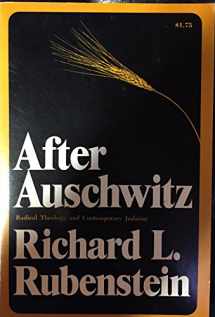
After Auschwitz: Radical Theology and Contemporary Judaism
Book details
Summary
Description
Richard L. Rubenstein (born 1924) is an educator in religion and a major writer in the American Jewish community, noted particularly for his contributions to Holocaust theology. In the mid-60's, he was considered one of the founders of the 'God is Dead Theology.' He wrote in the Preface to this 1966 book, "A religious community has some semblance to a living organism. It is impossible savagely to rip out half of its substance without drastically affecting the surviving remnant. The first reaction to such a wounding must be shock and numbness. I do not believe the period of shock has entirely spent itself. It is only now that a tentative attempt can be made to assess the religious meaning of the events. This book represents one such attempt." Here are some additional quotations from the book: "Although Jewish history is replete with disaster, none has been so radical in its total import as the holocaust. Our images of God, man, and the moral order have been permanently impaired. No Jewish theology will possess even a remote degree of relevance to contemporary Jewish life if it ignores the question of God and the death camps." (Pg. x) "When I wrote this paper, I saw Israel's rebirth as 'the beginning of redemption.' I no longer so regard it." (Pg. 130) "I do not believe that a Divine-human encounter took place at Sinai nor do I believe that the norms of Jewish religious life possess any superordinate validation." (Pg. 145) "How can Jews believe in an omnipotent, beneficient God after Auschwitz?" (Pg. 153) "The revelation of the death camps caused me to reject the whole optimistic theology of liberal religion... The death camps spelled the end of my optimism concerning the human condition." (Pg. 216)


We would LOVE it if you could help us and other readers by reviewing the book
Book review



